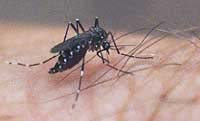Making a Friendlier Mosquito

Researchers say genetically modifying mosquitos that can’t transmit malaria may help suppress the disease. (Debbie Aldridge/UC Davis photo)
Genetically modified mosquitoes that cannot transmit malaria are one hope for battling the disease that still kills over one million people a year. But that plan faces some serious snags, according to UC Davis researchers who are suggesting an alternative strategy.
Other scientists have proposed controlling malaria by releasing into the wild mosquitoes genetically engineered to resist malaria. If the resistant mosquitoes breed and spread their genes through the population, malaria transmission should be shut down. The malaria parasite depends entirely on female Anopheles mosquitoes to spread from person to person.
That plan faces two problems, say postdoctoral researcher Matthew Hahn and Sergey Nuzhdin, a professor of evolution and ecology at UC Davis. First, the malaria resistance genes available are not very effective. Second, there’s no way to reliably push the genes through the population.
To put genes into an insect, scientists use a mobile piece of DNA called a transposon. Transposons are essentially DNA parasites that snip themselves in or out of the genome under the right circumstances. Scientists can add a new gene into a transposon and use it to carry that DNA into the insect genome. But it’s in the interest of that transposon to just get rid of the extra DNA, Hahn said.
Hahn and Nuzhdin propose an alternative strategy. They suggest designing a transposon that gives an advantage to mosquitoes that already carry genes to block malaria, so that those genes spread through the population by natural selection.
The genetic engineering work involved is challenging but should be possible, Hahn said.
The work is published in the April 6 issue of the journal Current Biology.
Media Contact
More Information:
http://www.news.ucdavis.edu/search/news_detail.lasso?id=6993All latest news from the category: Life Sciences and Chemistry
Articles and reports from the Life Sciences and chemistry area deal with applied and basic research into modern biology, chemistry and human medicine.
Valuable information can be found on a range of life sciences fields including bacteriology, biochemistry, bionics, bioinformatics, biophysics, biotechnology, genetics, geobotany, human biology, marine biology, microbiology, molecular biology, cellular biology, zoology, bioinorganic chemistry, microchemistry and environmental chemistry.
Newest articles

Wildfire danger to increase due to climate change
WSL Institute for Snow and Avalanche Research (SLF) researchers expect an elevated wildfire danger in the Alpine Foreland from 2040 onwards due to changing meteorological conditions. The danger currently remains…

Advanced Brain Science Without Coding Expertise
Researchers at Helmholtz Munich and the LMU University Hospital Munich introduce DELiVR, offering a new AI-based approach to the complex task of brain cell mapping. The deep learning tool democratizes…

Gentle defibrillation for the heart
Using light pulses as a model for electrical defibrillation, Göttingen scientists developed a method to assess and modulate the heart function. The research team from the Max Planck Institute for…





















